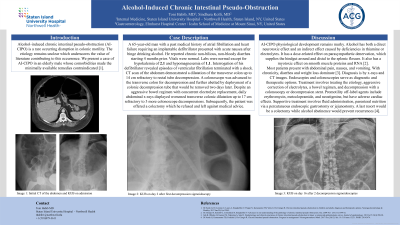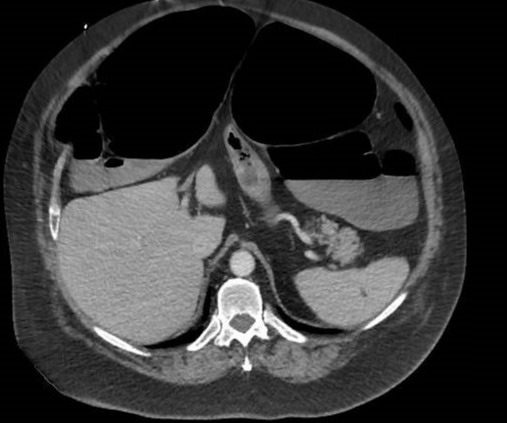Tuesday Poster Session
Category: Colon
P3811 - Alcohol-Induced Chronic Intestinal Pseudo-Obstruction
Tuesday, October 29, 2024
10:30 AM - 4:00 PM ET
Location: Exhibit Hall E

Has Audio

Toni Habib, MD
Staten Island University Hospital, Northwell Health
Staten Island, NY
Presenting Author(s)
Toni Habib, MD1, Sindhura Kolli, MD2
1Staten Island University Hospital, Northwell Health, Staten Island, NY; 2Elmhurst Hospital Center / Icahn School of Medicine at Mount Sinai, New York, NY
Introduction: Alcohol-induced chronic intestinal pseudo-obstruction (AI-CIPO) is a rare occurring disruption in colonic motility. The etiology remains unclear which underscores the value of literature contributing to this occurrence. We present a case of AI-CIPO in an elderly male whose comorbidities made the minimally available remedies contraindicated.
Case Description/Methods: A 65-year-old man with a past medical history of atrial fibrillation and heart failure requiring an implantable defibrillator presented with acute nausea after binge drinking alcohol. He reported chronic non-bilious, non-bloody diarrhea starting 4 months prior. Vitals were normal. Labs were normal except for hypokalemia of 2.1 and hypomagnesemia of 1.1. Interrogation of his defibrillator revealed episodes of ventricular fibrillation terminated with a shock. CT scan of abdomen demonstrated a dilatation of the transverse colon upto 14 cm refractory to rectal tube decompression. A colonoscope was advanced to the transverse colon for decompression and further abetted by deployment of a colonic decompression tube that would be removed two days later. Despite an aggressive bowel regimen with concurrent electrolyte replacement, daily abdominal x-rays displayed worsened transverse colonic dilatation up to 17cm refractory to 3 more colonoscope decompressions. Subsequently, the patient was offered a colectomy which he refused and left against medical advice.
Discussion: AI-CIPO physiological development remains murky. Alcohol has both a direct neurotoxic effect and an indirect effect caused by deficiencies in thiamine or electrolytes. It has a dose-related effect on parasympathetic denervation, which supplies the hindgut around and distal to the splenic flexure. It also has a myotoxic effect on smooth muscle proteins and RNA.
Most patients present with abdominal pain, nausea, vomiting. With chronicity, diarrhea and weight loss dominate. Diagnosis is by x-rays and CT images. Endoscopies and colonoscopies serve as diagnostic and therapeutic options. Treatment involves treating the etiology, aggressive correction of electrolytes, a bowel regimen, and decompression with a colonoscopy or decompression stent. Promotility off-label agents include erythromycin, metoclopramide, and neostigmine, but have adverse cardiac effects. Supportive treatment involves fluid administration, parenteral nutrition via a percutaneous endoscopic gastrostomy or jejunostomy. A last resort would be a colectomy while alcohol abstinence would prevent recurrences.

Disclosures:
Toni Habib, MD1, Sindhura Kolli, MD2. P3811 - Alcohol-Induced Chronic Intestinal Pseudo-Obstruction, ACG 2024 Annual Scientific Meeting Abstracts. Philadelphia, PA: American College of Gastroenterology.
1Staten Island University Hospital, Northwell Health, Staten Island, NY; 2Elmhurst Hospital Center / Icahn School of Medicine at Mount Sinai, New York, NY
Introduction: Alcohol-induced chronic intestinal pseudo-obstruction (AI-CIPO) is a rare occurring disruption in colonic motility. The etiology remains unclear which underscores the value of literature contributing to this occurrence. We present a case of AI-CIPO in an elderly male whose comorbidities made the minimally available remedies contraindicated.
Case Description/Methods: A 65-year-old man with a past medical history of atrial fibrillation and heart failure requiring an implantable defibrillator presented with acute nausea after binge drinking alcohol. He reported chronic non-bilious, non-bloody diarrhea starting 4 months prior. Vitals were normal. Labs were normal except for hypokalemia of 2.1 and hypomagnesemia of 1.1. Interrogation of his defibrillator revealed episodes of ventricular fibrillation terminated with a shock. CT scan of abdomen demonstrated a dilatation of the transverse colon upto 14 cm refractory to rectal tube decompression. A colonoscope was advanced to the transverse colon for decompression and further abetted by deployment of a colonic decompression tube that would be removed two days later. Despite an aggressive bowel regimen with concurrent electrolyte replacement, daily abdominal x-rays displayed worsened transverse colonic dilatation up to 17cm refractory to 3 more colonoscope decompressions. Subsequently, the patient was offered a colectomy which he refused and left against medical advice.
Discussion: AI-CIPO physiological development remains murky. Alcohol has both a direct neurotoxic effect and an indirect effect caused by deficiencies in thiamine or electrolytes. It has a dose-related effect on parasympathetic denervation, which supplies the hindgut around and distal to the splenic flexure. It also has a myotoxic effect on smooth muscle proteins and RNA.
Most patients present with abdominal pain, nausea, vomiting. With chronicity, diarrhea and weight loss dominate. Diagnosis is by x-rays and CT images. Endoscopies and colonoscopies serve as diagnostic and therapeutic options. Treatment involves treating the etiology, aggressive correction of electrolytes, a bowel regimen, and decompression with a colonoscopy or decompression stent. Promotility off-label agents include erythromycin, metoclopramide, and neostigmine, but have adverse cardiac effects. Supportive treatment involves fluid administration, parenteral nutrition via a percutaneous endoscopic gastrostomy or jejunostomy. A last resort would be a colectomy while alcohol abstinence would prevent recurrences.

Figure: Computed tomography with contrast demonstrating dilated transverse colon with no obstruction
Disclosures:
Toni Habib indicated no relevant financial relationships.
Sindhura Kolli indicated no relevant financial relationships.
Toni Habib, MD1, Sindhura Kolli, MD2. P3811 - Alcohol-Induced Chronic Intestinal Pseudo-Obstruction, ACG 2024 Annual Scientific Meeting Abstracts. Philadelphia, PA: American College of Gastroenterology.
